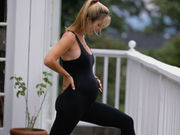International Olympic Committee finds little evidence exercise prolongs labor or ups premature birth risk
THURSDAY, Oct. 13, 2016 (HealthDay News) — Strenuous exercise during pregnancy doesn’t appear to increase the risk of most pregnancy complications for mother or baby, a new report from the International Olympic Committee (IOC) says. The statement was published online Oct. 12 in the British Journal of Sports Medicine.
The new statement is one of several reports on exercise and pregnancy prepared by the IOC.
In this report, the committee found that there’s high and moderate evidence, respectively, that exercise during pregnancy reduces the risk of excess weight in babies at birth, and doesn’t boost the risk of labor complications such as the need for induced labor or episiotomy. In addition, there’s moderate evidence that exercise doesn’t prolong labor, boost the risk of premature birth, or increase the risk of complications in the infant at birth. It’s not clear if exercise lowers the risk of cesarean birth or lowers the risk of tissue trauma and muscular tears during delivery.
For women who engage in high-intensity training routines, the Olympic statement recommended that these women cut back on their routine in the week after ovulation when they’re trying to become pregnant. Intense exercise during this time might affect the ability of the fertilized egg to implant on the wall of the uterus, the IOC statement suggested. There’s also some evidence that repetitive weight training during the first three months of pregnancy could lead to a higher risk of miscarriage.
Full Text
Copyright © 2016 HealthDay. All rights reserved.








